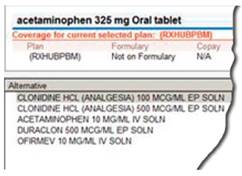Use Caution When “Alternatives” Are Proposed with Ambulatory E-Rx Systems
A hospital recently informed us of a concern that relates to messaging that prescribers may receive when they choose medications listed in their ambulatory electronic medical record system. If the medication is not a covered formulary item according to the patient’s insurance provider, their particular software configuration may list covered therapeutic alternative selections as a message or alert that appears automatically. However, some hospitals have discovered that the “therapeutic alternatives” may not be appropriate in a given situation and we’ve learned of near misses and even errors that have occurred with improper substitutions. For example, Figure 1 shows a screenshot where cloNIDine (listed as an analgesic adjuvant drug) was recommended as a substitute for acetaminophen. Although the drugs listed as alternatives might be considered analgesics, not all should be listed as “alternatives,” as they are in this screen shot below from an EpicCare hospital.

This same issue may occur with other software systems as well. In another case, alternatives listed when nonformulary cholecalciferol (vitamin D) was ordered included other fat soluble vitamins - vitamin K (phytonadione) and vitamin A. And in yet another case, ALPRAZolam, a benzodiazepine, was listed as an alternative for clorazepate, a benzodiazepine derivative. At this time we are unsure if this situation involves specific vendors or how the system is configured, and it might also depend on the formulary information or formatting provided by the patient’s insurance company, PBM, or the data transfer process from drug information system vendors. Similar “alternative” listings can occur at other health systems so please take some time to look carefully at the system you are using in ambulatory care and caution others as necessary. Two of the companies we’ve spoken with are Epic and Surescripts. The concern is being further investigated by them and we will provide additional information as it becomes available. Health-systems may not have the ability to disable these automatic “alternative” alerts at this time. Therefore, providers must critically evaluate and practice with a questioning mind when reviewing these alerts.
